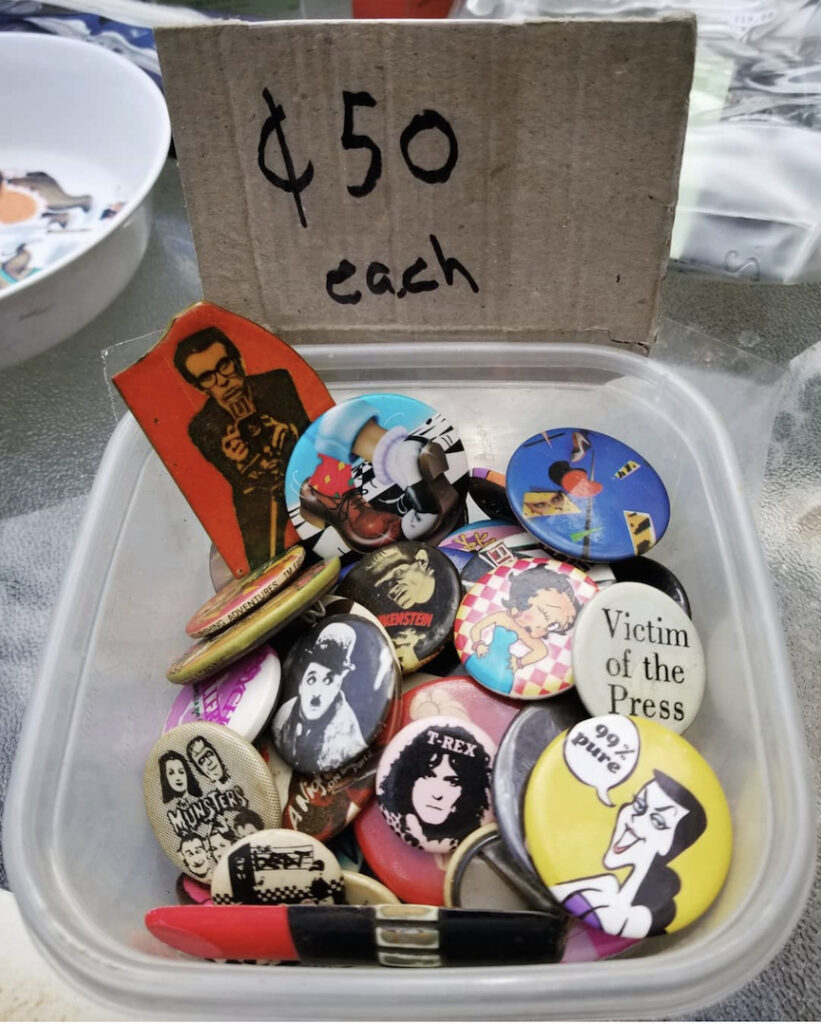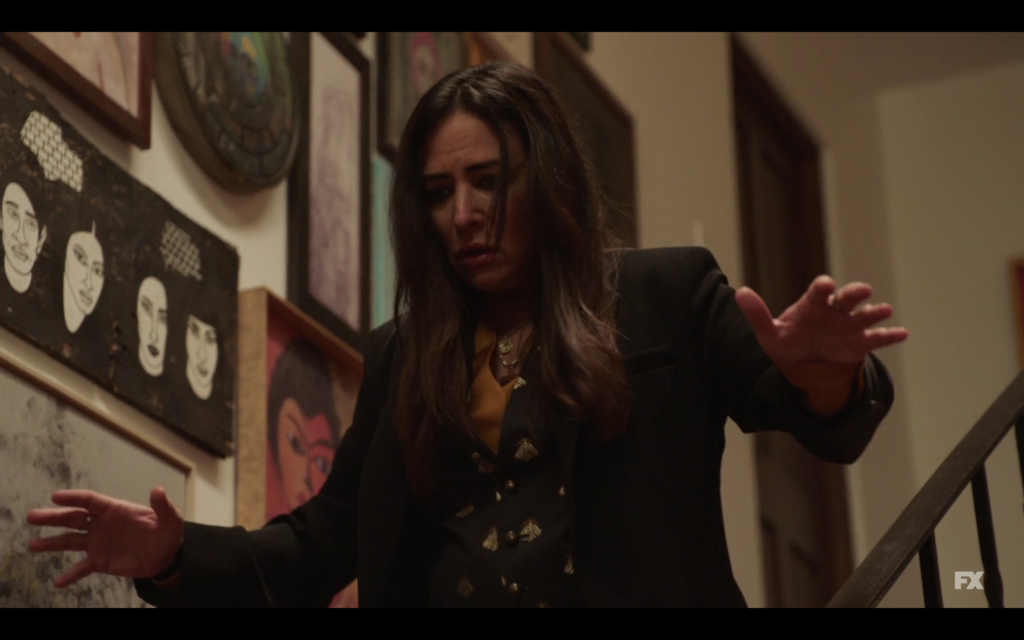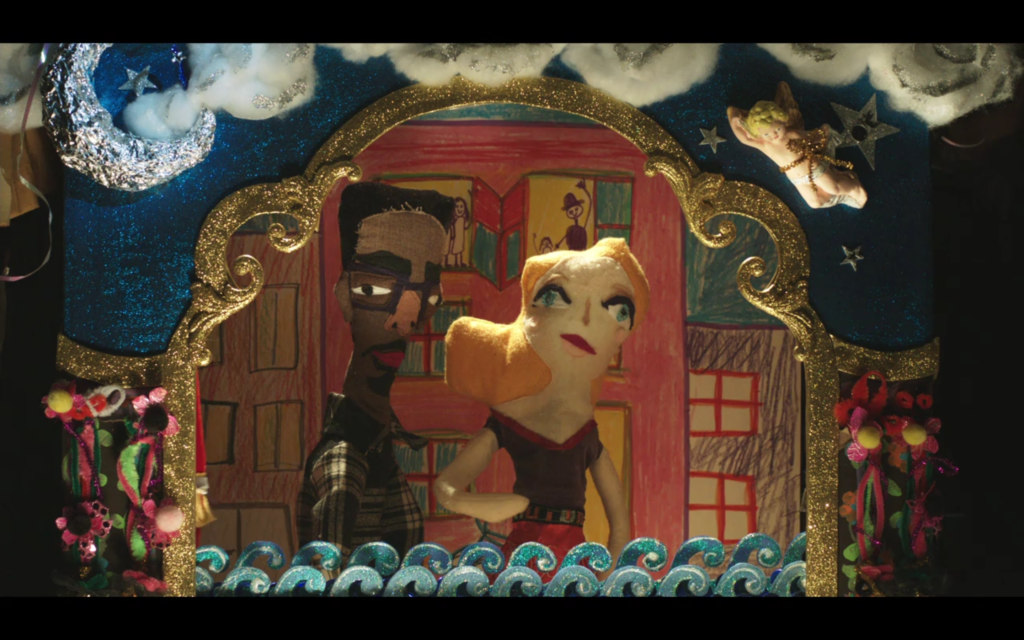Garage Sale, 2020, Mom’s Records, Everything Must Go
Do you ever spend the night away from home and when you awake the next morning it takes you a few moments to realize where you are? You have no sense at all that you’re not in your own bed until you open your eyes and see a completely different surrounding than what you were expecting. I’ve been experiencing some form of this a lot lately. And seeing as I moved out of my house when I was 23, and I’ve been living in the same apartment for the last four years, it’s quite strange that suddenly I’ve been waking up in my childhood bedroom.
I hear birds chirping and I think that they’re perched on the cherry blossom tree in my front yard, whose branches would stretch all the way to my window. I feel the sun on my face and think that when I open my eyes, I’ll see the light shining onto a Rocky Horror poster hanging on the wall across from my bed. It’s the poster that used to hang in my mother’s old bedroom at my grandmother’s house.
Both houses are gone now. Well, they’re sold. I don’t know precisely when or to whom, as our involvement (me and my siblings), in any of those matters, was… fraught. We were never particularly close with our extended family, so losing our mother and grandmother meant losing what little connection we had, effectively dissolving us into strangers. Our existence reduced to whatever financial imposition we might cause. But I digress.
These moments of morning are fleeting and unpredictable, so I savor them. Whether this place is real or imagined doesn’t matter because it feels safe; a foreign sensation to me these days.
I was there again today but I wasn’t alone. I looked over and my mother was sitting by my side, holding a book of poems and eagerly trying to show me an excerpt she had underlined for me. My mother always curated the best poems – the best songs, the best books, the best films etc. – and knew exactly what to recommend for whatever my needs were, wherever I was in life. It was prescriptive, as though she were a sort of physician of arts, armed with a vast understanding of every discipline and administering their healing properties however needed. It was through the art she shared that I felt seen, I felt understood, I felt less alone in my own experience.

It’s only now that I’ve come to appreciate how impressive this was. Today we live in an age-of-algorithm, in which we have access to the worlds we wish to explore with just the swipe of a finger, and those worlds are tailored to our tastes. My mother was self-taught, learning everything she knew by her own private and determined exploration. I picture her as a teenager in her old bedroom, sprawled out on the green shag carpet under that same poster, staying up late through the night assiduously underlining a T.S. Elliot book, perhaps listening to one of her Donna Summers records in the background.
Sadly I can’t remember what poem she was trying to show me this morning, but I remember the enthusiasm and generosity of spirit that was so typical of her nature. Although to remember such a thing is not typical for me, because it’s not often that I dream of her at all, let alone in a way that isn’t frightening or sad.
It’s difficult to explain but despite being constantly on my mind, I don’t really think of her at all. If I were asked to recall a specific memory with her before she got sick, I couldn’t. I can’t think of a single instance when we laughed together, despite knowing that we used to laugh all the time. I’m aware that this is a trauma mechanism; the pain of loss was so immense that in a rather indelicate form of minesweeping, my brain sought out every possible memory and erased it, regardless of whether it was good or bad.
Shucks.
The delight of memory deficit aside, a traumatized brain also has difficulty forming new memories, as few things manage to hold its focus. Among those few precious things for me, is a show called ‘Better Things.’ It’s loosely based on the life of its creator and star, Pamela Adlon; how she exists as a mother, a sister, a daughter, a friend, an artist, a human. What makes it particularly comforting to me is how much her character, Sam, reminds me of my own mother. The way she worked so hard to raise three kids on her own. The way we took it for granted. Her kindness. Her coolness. That elusive rockstar quality she had while also being sort of goofy. Even her jewishness. Not to mention the parallels with her parents. I never met my grandfather because he died when she was just a teenager, but his death became a shadow that cast over the rest of her life. My grandmother on the other hand was very present, the ultimate matriarch, and my mother was devoted to her, despite their fundamental differences.

A fixture in the show is Sam’s home, a Spanish Villa in the hills of Los Angeles with so much character that one could say it plays its own role in the series. Every square inch is accented by colorful, curious, and distinct pieces of art, often changing from season to season, but one particular piece has remained a constant – a statue of a boy wearing a beanie who stands on a table at the top of the stairs. Appearing in numerous episodes he serves as more than just adornment but as a touch post for Sam and her daughters, a sort of anthropomorphized mezuzah. But this season, in the final scene of the first episode, their beloved beanie boy falls and shatters to pieces.
In a companion podcast for the season, Adlon discusses this moment with two of her costars, Diedrich Bader and Kevin Pollak. I’ve loosely transcribed the conversation below:
Bader: [It’s a testament to] how delicate a balance we maintain in our lives and it all can be thrown off in a way, and we don’t know – it’s not glued down. It’s just there. We just exist, we just have friendships, we just live, and everything can be taken away.
Adlon: And you can’t take it for granted.
Pollak: Also the power you give this fellow all throughout the course of the series is seemingly just superstition.
Adlon: Yes. You’re putting power into something that’s an object. And that’s what Phyl [Sam’s mother] is saying, ‘It’s just gack. It’s been in a box so long that it just becomes a box.’ And that’s what happens if you’re hoarding and you have boxes all around you. If it’s in a box for a month, you’re like ‘Wait, I think that that’s my baseball cards and maybe some photo albums,’ and then after a year or two years – you completely forget. It’s just a box, it’s taking up space. But then Sam opens it and she says, ‘But no, Phyl, look you open it and here’s a picture of your brother.’ It’s a dichotomy [paradox].”
Everything is ephemera and everything is precious.
As for myself, I don’t know if I’ll ever have a home of my own in which to hang my art. To expand my record collection. To sit at a piano and have friends over to play music. To dust off my pots and pans and cook for them. To spread out and dance with them. As the cost of living continues to outpace our meager earnings and all across the world houses are being bought up by private companies and financial institutions, most of us will probably never get to experience those pleasures.
I rent a room in an apartment that I share with two other people. I have some boxes filled with knick knacks from the house. Some photographs. Childhood drawings. Notebooks. And lots and lots of clothing. It’s far more than I can fit into my small bedroom but I’m grateful that this place has a spare room in which I can safely keep some boxes… for now.
But what if I want to move? What will I do with the objects that link me to my past? I don’t know if I’ll ever have children to whom I can show them. Will they even mean anything by then? Maybe not. But surely I should hold onto them. Right? Then I watch the news and see families fleeing their homes, their countries, taking nothing with them but what they can carry, not knowing if they’ll have anything to return to or if they’ll even return at all.
A lot of my digital images aren’t backed up on any hard drive and I’ve already lost many of them to the ether. At least for now, I can be grateful that my emails are still accessible. And while there aren’t many between me and my mother, I cherish them all. In an email from 2014, my mother sent me a quote from a film called, “Two Days in New York,” a romantic comedy starring and written by Julie Delpy. It was one of those films that just happened to be on at 3AM while she was awake, searching for something to salve her restless mind (a tendency she clearly never outgrew). The quote is from the final scene in the movie in which Delpy’s character narrates:

If you live your life with one person only, one day they’ll be gone or you’ll be gone. And one of you will be left in the cold world. The family we are born in eventually vanishes. By then you have created your own family if you’re lucky. First you have to choose the person you’ll build this family with, and stick to it as much as possible. How many tries do you get before you strike out? When my mother died, just a few hours before the end, she looked in my eyes and had the expression of a little girl who didn’t know what was happening to her. The same as when Lulu [my son] was born. Something totally pure. So I guess we can do all the growing up we can. In the end, at the core, we stay the same. But before that sad ending that awaits all of us, maybe we can share beautiful, ephemeral moments with the people we love.
My mother didn’t write anything in the email to explain why the quote was meaningful to her. I only vaguely remember her telling me that the words struck her and she just felt she needed to share them with me. To be honest I couldn’t really understand it at the time, but not three years later I would witness that same look that Delpy described enter my mother’s eyes in her final moments.
That’s the thing about art, whether by creating it or consuming it, it’s how we make sense of life. While a piece might be meaningless to one person, it could mean so much to someone else. A passage that didn’t make sense 10 years ago could make you cry today. A joke could make one person laugh but infuriate another.
The point is, we need it. All of it. Because all of it matters and none of it matters at all.